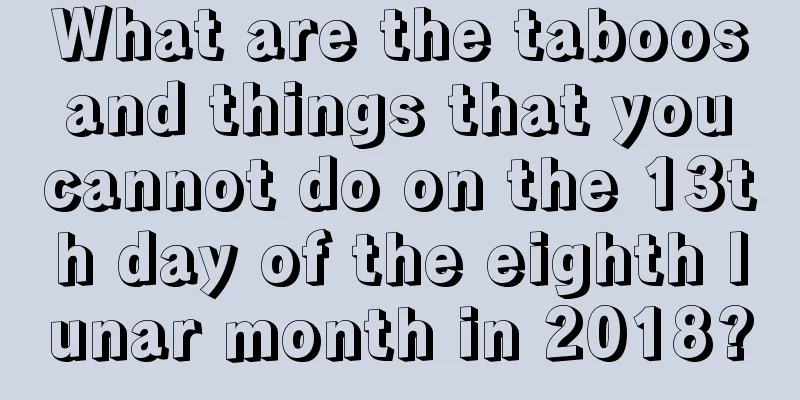Can’t we sweep the floor on New Year’s Eve? What are the rules for sweeping the floor during the Chinese New Year?

The word "chu" in New Year's Eve originally means to get rid of the old and bring in the new, representing the end of the old year and the beginning of the new year. So, is it not allowed to sweep the floor on New Year's Eve? What are the rules for sweeping the floor during Chinese New Year? If you want to know more about the 2019 Chinese New Year, please follow our Shui Mo Xiansheng website!Can’t we sweep the floor on New Year’s Eve?New Year’s Eve usually falls on the 29th or 30th day of the twelfth lunar month, so it is also called New Year’s Eve. Folks attach great importance to the New Year's Eve. Every household is busy cleaning the house, getting rid of the old and bringing in the new, hanging up lanterns and decorations, welcoming ancestors home to celebrate the New Year, and offering them rice cakes, three kinds of meat, three kinds of tea and five kinds of wine. New Year's Eve means getting rid of the old and bringing in the new, so you can sweep the floor on New Year's Eve. However, it should be noted that sweeping the floor from the first to the fifth day of the Chinese New Year is unlucky . People usually believe that sweeping the floor from the first to the fifth day of the Chinese New Year will "sweep away wealth" and affect your fortune in the new year. Therefore, sweeping the floor from the first to the fifth day of the Chinese New Year is not recommended.What are the rules for sweeping the floor during Chinese New Year?In ancient times, the general cleaning of the Spring Festival was called "sweeping the year", which originated from a religious ritual of ancient people to drive away diseases and epidemics. Later it gradually evolved into a year-end cleaning. It is a traditional custom of our people. In the north it is called "sweeping the house" and in the south it is called "dusting". Every household has to clean the environment, wash various utensils, take apart and wash bedding and curtains, sweep the courtyard, dust off dust and cobwebs, and dredge open and underground ditches. In the north, cleaning the house in the twelfth month of winter means just dusting and sweeping, but in the south, tables, chairs, benches, and even large bunk beds are often carried to the riverside or well to be cleaned. After sweeping the house, the whole family will start preparing New Year's goods, such as buying incense, candles, paper codes, offerings, writing couplets, cutting window flowers, buying hanging money, New Year pictures, and firecrackers. From north to south, the atmosphere is filled with joy and enthusiasm to clean up and welcome the New Year in a clean manner.What are the customs on New Year’s Eve?1. In ancient times, this custom of visiting graves was very popular. Due to different customs in different places, the forms of ancestor worship are also different. Some people go to the wild to worship their ancestors' tombs, some go to the ancestral temple to worship their ancestors, and most of them place the ancestral tablets in the main hall at home, display offerings, and then the worshipers burn incense and kneel down in order of seniority. When the Han people worship their ancestors, they usually prepare fish and meat dishes, which are served in tall bowls, which gives the impression of being feasted on a tripod.2. Inviting and sending off gods: "receiving gods" should be done at 3 or 4 pm on New Year's Eve, and "sending off gods" should be done at night on the second day of the New Year. It is better to "receive gods" early and "send gods" late. Those who were welcomed early included noble gods, gods of joy and gods of wealth, while those who were welcomed late only had some homeless poor ghosts and evil gods who went to chase people away for some drinkable water. The gods are sent off at around 8 or 9 o'clock in the evening on the second day of the New Year. If they are sent off late, it means that the family lives a prosperous life, serves the gods well, and seems reluctant to leave. Others "send off the gods" in the early morning of the third day of the Lunar New Year. They get up early to make dumplings, burn incense and set off firecrackers to send the gods off. No one has seen what God looks like. It is just a thought. 3. Making dumplings: Making dumplings on New Year’s Eve is a Chinese tradition. Dumplings must be eaten on New Year’s Eve, so every household will get up early to make dumplings. Among the many dumplings, only a few are made with peanuts or other nuts. Whoever eats such dumplings will have good luck in the new year and is auspicious. 4. Eating New Year’s Eve dinner New Year’s Eve is the most important day of the year and the day for family reunion. On New Year’s Eve, the whole family gathers together, eats the New Year’s Eve dinner, and waits for the moment to bid farewell to the old and welcome the new. Every household prepares a sumptuous New Year’s Eve dinner. In addition to the whole family eating together to express harmony and reunion, they also must offer sacrifices to their ancestors before eating and pray for the blessings of their spirits. |
>>: Is the fifth day of the first lunar month in 2019 suitable for opening a new store or company?
Recommend
Is it suitable to go to a 4S store to pick up a car on November 18th of the lunar calendar in 2020? How are you doing?
November is one of the three coldest months befor...
Is the Dragon Boat Festival 2020 a good date for engagement? What is the meaning of dragon boat racing on the Dragon Boat Festival?
Introduction: It is necessary to choose an auspici...
What are the do's and don'ts on April 27th of the lunar calendar in 2022? Can the door be installed according to the lunar calendar?
The fourth month of the lunar calendar has arrived...
Is it possible to move on the third day of the first lunar month in 2022? How to choose an auspicious day for moving?
There are certain rules for choosing the time to m...
What are the auspicious days for starting work in August of the lunar calendar in 2019?
Most people have the mentality of seeking good for...
What is the fate of a boy born on the fifth day of the tenth month of the lunar calendar? Do you often have noble people to help you?
Introduction: Although every child cannot choose t...
Is August 12, 2020 a suitable day for ancestor worship? Is the hexagram on September 28 a good one?
Introduction: It is necessary to choose an auspici...
Is it suitable to pick up a car on December 11th of the lunar calendar in 2019? What are the auspicious days for picking up a car?
There are some rules for picking up a car. Is Dec...
Is the 15th day of the seventh lunar month in 2019 an auspicious day for sacrifices? Is it appropriate to visit the graves and worship ancestors today?
Introduction: The 15th day of the seventh month of...
Is December 22, 2020 a suitable date for opening a new store?
Is December 22, 2020 a suitable date for opening ...
New Year and Spring Festival WeChat greetings 2019 New Year and Spring Festival how to send greetings
In today's information age, you would feel emb...
What is the date of the 13th day of the first lunar month in 2018?
What day is the 13th day of the first lunar month...
Is it okay to pray on the 11th day of the sixth lunar month in 2018? What is the fortune of praying on that day?
Let us find out whether the eleventh day of the si...
Is April 26th of the lunar calendar 2020 a good day? Sign the contract, please?
The pros and cons of signing a contract on differe...
What is the zodiac sign for people born on the fourth day of the second lunar month in 2022? Which zodiac sign is suitable?
The second month of the lunar calendar is the seco...









